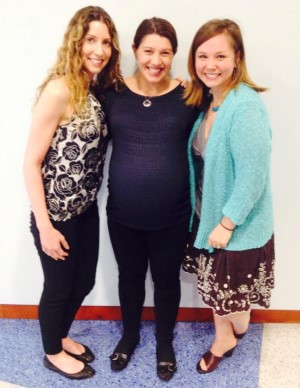Medicine robs you of the most important moments of your life. We need a more accommodating system.
Induction Day.
When you are 38 weeks pregnant with twins, this day comes with mixed emotions. But even more so when you are a second-year medical student about to sit for the first, and most important, of your medical licensing boards.

Step 1 determines which specialty you will match into and, often, your potential future earnings and career longevity. At 38 weeks people would often ask, “Aren’t you ready to deliver?! You must be tired of being pregnant!” My answer: “Yes. No.” Yes, I was tired of carrying around 2 babies and not being able to sit behind a computer, steering wheel, stand up without a forklift, plus I couldn’t remember the last time I saw my feet or was able to tie shoelaces. No, because I had so much to do. I was glad I had made it through my rigorous finals week, which consisted of 5 exams, 3 of which addressed 2 years of cumulative information in 1 week. But I digress.
I had made it. To 38 weeks. To my last final. It was a 7 am psychiatry exam; I woke up at 5 am, and my mother drove me the hour each way to campus because I didn’t fit behind the steering wheel. Then there was a clerkship orientation, which I attended because I didn’t want to give anyone a reason to dismiss me. THEN I was ready for my induction. I exchanged my exam study materials for my maternity “go bag,” which included my Step 1 prep book.
This is how medicine robs you of the most important moments of your life.
From before the moment my twins were born, I was distracted by medicine. Who brings a Step 1 prep book to labor/delivery when they’re the patient? I didn’t have a birth playlist. I didn’t have baby books. But I did have my Step 1 book. I didn’t open it, but it nagged me all through the night, as I waited to bring my children into the world.
The next morning, my OB/GYN discussed my failed induction, how my son was having late decelerations and it would be safest if I underwent a c-section. I was secretly relieved because after finals week I was exhausted. After a night of no sleep – made impossible by the uncomfortable position required to make sure the toco monitors worked – I was exhausted.
Then they were there, my son and daughter, the most important people in my life next to my husband. And when they were 2 weeks old, when I was still trying to figure out how to breastfeed, how to pump, how to hold my 4 lb son, I had to leave them. Step 1 and clinical rotations loomed; I had to study.
My mother and husband, who are ceaselessly supportive and loving, took over my role.
I am fortunate to have them. But medicine assumes that because I want to be a doctor, I don’t want to be a mother. Medicine thinks I wanted to abandon my children when they were tiny; 2 weeks old was the last time I was able to focus entirely on them.
Medicine is more than dehumanizing. Some days I cry to myself, some days I cry to my husband because I missed it all and I wish I could go back. I wish I could have been present. I don’t think real maternity leave is too much to ask.
It makes me so angry - actually, that’s not a strong enough word. Infuriated, enraged. They robbed me of the first month of my children’s lives. The powerlessness of being a medical student (whom medical schools and residencies exploit) prevents us from asking for what we need.
What we need is an accommodating system. I’m tired of being forced to be grateful for scraps of humanity and equity.
Now that I’ve finished residency, I look forward to focusing on my family again. But I am infuriated and enraged by what I have lost. It eats away at me every day. The pain is palpable, physical, it tugs at the very fibers of my soul. It comes unexpectedly and without conscious thought. And then I have to go work a shift or attend didactics or journal club or a mandatory residency event when all I want to do is hold my family. Breathe in my children. Feel the fine, soft hairs of their heads run through my fingers and read them a bedtime story.
This is not just my story. This is the story of being a parent in medical training and an example of how medicine tries to rob us of what we cherish. Things are changing, but there is more work to be done.



